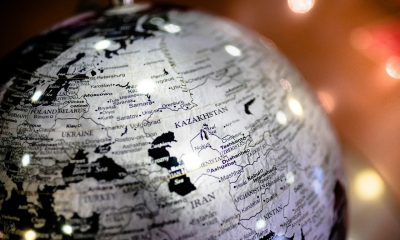US
Demokrasie sterf in Sentraal-Asië - dit is wat Biden moet doen

On 11 April, Kyrgyzstan will go to the polls to vote on a new constitution that gives the president extensive new powers and threatens the most vibrant civil society in Central Asia. The vote is a potential milestone for Kyrgyzstan's dissent into autocracy. Long the freest country in the region, Kyrgyzstan is starting down a slippery slope of democratic decline. It is a path that neighboring China and former colonial power Russia will be happy to help Kyrgyzstan down since corruption and a lack of transparency make it easier for them to flex their influence in the small Central Asian country, skryf Dr. Erica Marat.
So far US President Joe Biden and Secretary of State Antony Blinken have been silent on the new constitution. That needs to change. Democracy and civil society in Kyrgyzstan matter not just because of Kyrgyzstan itself, but because for years as democracy has declined in neighboring countries Kyrgyzstan has stood out as a model for what democracy and civil society can achieve. It showed that if Kyrgyzstan could do it, larger wealthier countries could too despite the assertions of their authoritarian leaders. It is an endeavor the US already has skin in, having invested $150 million [results.usaid.gov] on supporting democracy and civil society in Kyrgyzstan in the past five years alone, and shouldn’t just walk away from.
At the heart of the decline is nativist Kyrgyz President Sadyr Japarov. Japarov was serving a 10-year sentence[rferl.org] for taking hostages during a protest when he was freed by protestors last October. Since then he has forced out the previous president, declared himself president before parliament could vote on the issue and supported the freeing of an influential organized-crime boss the US has said is guilty of running drug, arms and human trafficking networks [rferl.org]. The new constitution would significantly weaken parliament while strengthening the presidency as Japarov tries to institute a political system more like Kyrgyzstan’s more authoritarian neighbors. Ahead of the referendum the political climate has continued to decline. Blogger Tilekmat Kurenov was arrested [kloop.kg] on 15 March and has been held since then. He opposes the referendum and had criticized Japarov’s decision to award control of the Jetim-Too ore field to China as a way of trying to hold off Kyrgyzstan’s mounting debts [rferl.org].
Police claimed he was arrested because of a Facebook post that incited violence, but the post has never been shown. After being arrested he was then charged with vote buying in the last parliamentary election. The move seems intended to silence critics ahead of the referendum. In addition to directly strengthening the presidency the new constitution envisions expansive financial reporting conditions on non-governmental organizations to limit and control them and allows the government to enforce vaguely defined “morale and ethical values.” These measures seem intended to muzzle organization that have previously monitored elections and reported on government abuses and are modeled on measures adopted by Russian President Vladimir Putin [freedomhouse.org] in order to monopolize political power. When it comes to Kyrgyzstan, the US faces a dilemma. The Biden Administration want to repair relationships with countries the Trump administration alienated, including China. But it also wants to re-establish US presence on the global stage and push for democracy and human rights. Those positions often clash, especially in countries where China would rather see pliable undemocratic regimes. Kyrgyzstan is one of those.
It is a key part of China’s flagship Belt and Road [rferl.org] initiative, which seeks to build an expansive “land bridge” to ensure future Chinese exports in a modern rebranding of the Silk Road. In Kyrgyzstan, China is looking for a leader it can do business with, not to promote the kind of civil society and democracy it is repressing over the border. In contrast the U.S. has supported civil society, human rights and independent media in Kyrgyzstan since 1991, investing hundreds of millions of dollars in supporting democracy and civil society. That commitment can’t be forgotten as Kyrgyzstan prepares to go down an authoritarian path. The Biden administration needs to condemn the referendum as the first step in showing a new uncompromising commitment to the programs that aided the development of civil society and democracy in Kyrgyzstan over the past three decades.
Dr. Erica Marat is associate professor and chairman of the Regional and Analytical Studies Department at National Defense University in Washington D.C. The opinions implied here are the author's own and do not reflect the views of National Defense University, the Defense Department, or any other agency of the US government, nor of EU verslaggewer.
Deel hierdie artikel:
-

 Konflikte4 dae gelede
Konflikte4 dae geledeKasakstan tree in: Oorbrug die skeiding tussen Armenië en Azerbeidjan
-

 uitbreiding4 dae gelede
uitbreiding4 dae geledeEU onthou die optimisme van 20 jaar gelede, toe 10 lande aangesluit het
-

 Covid-194 dae gelede
Covid-194 dae geledeGevorderde beskerming teen biologiese middels: die Italiaanse sukses van ARES BBM - Bio Barrier Mask
-

 Motors4 dae gelede
Motors4 dae geledeFiat 500 vs Mini Cooper: 'n gedetailleerde vergelyking



























